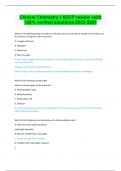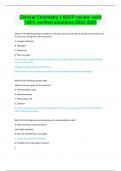Clinical chemistry i - Study guides, Class notes & Summaries
Looking for the best study guides, study notes and summaries about Clinical chemistry i? On this page you'll find 1133 study documents about Clinical chemistry i.
Page 4 out of 1.133 results
Sort by
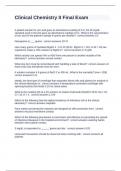
-
Clinical Chemistry II Final Exam with correct answers 2024
- Exam (elaborations) • 26 pages • 2024
- Available in package deal
-
- $13.49
- + learn more
A patient sample for uric acid gave an absorbance reading of 0.4; the 50 mg/dL standard used in the test gave an absorbance reading of 0.1. What is the concentration of uric acid in the patient's sample in grams per deciliter? correct answers 0.2 Nanograms is ___ grams. correct answers 10^-9 How many grams of hydrated MgSO 4 ⋅ 5 H 20 (M.W.: MgSO 4 = 119, H 20 = 18) are required to make a 10% solution of MgS0 4? correct answers 17.6 g/dL Which activity can spread HIV or HBV from on...
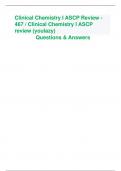
-
Clinical Chemistry I ASCP Review - 467 / Clinical Chemistry I ASCP review (youlazy) Questions & Answers Which of the following lamps provides a continuous spectrum of radiant energy in the visible, near IR, and near UV regio
- Exam (elaborations) • 205 pages • 2024
-
- $11.49
- + learn more
Clinical Chemistry I ASCP Review - 467 / Clinical Chemistry I ASCP review (youlazy) Questions & Answers Which of the following lamps provides a continuous spectrum of radiant energy in the visible, near IR, and near UV regions of the spectrum? A. Tungsten-filament B. Hydrogen C. Deuterium D. Mercury vapor - CORRECT ANSWER-A most common light source for photometry in the visible region. continuous spectrum (360-800 nm). near IR and UV. Hydrogen ...
Clinical Chemistry I ASCP review -with 100% verified solutions-
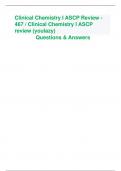
-
Clinical Chemistry I ASCP Review - 467 / Clinical Chemistry I ASCP review (youlazy) Questions & Answers Which of the following lamps provides a continuous spectrum of radiant energy in the visible, near IR, and near UV regions of the spectrum? A. Tungsten
- Exam (elaborations) • 205 pages • 2024
-
- $12.49
- + learn more
Clinical Chemistry I ASCP Review - 467 / Clinical Chemistry I ASCP review (youlazy) Questions & Answers Which of the following lamps provides a continuous spectrum of radiant energy in the visible, near IR, and near UV regions of the spectrum? A. Tungsten-filament B. Hydrogen C. Deuterium D. Mercury vapor - CORRECT ANSWER-A most common light source for photometry in the visible region. continuous spectrum (360-800 nm). near IR and UV. Hydrogen and Deuterium (200-375 nm) Mercury vap...
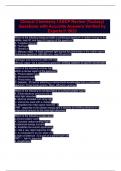
-
Clinical Chemistry I ASCP Review (Youlazy) Questions with Accurate Answers Verified by Experts!!! 2023
- Exam (elaborations) • 87 pages • 2023
-
- $12.49
- + learn more
Which of the following lamps provides a continuous spectrum of radiant energy in the visible, near IR, and near UV regions of the spectrum? A. Tungsten-filament B. Hydrogen C. Deuterium D. Mercury vapor - A most common light source for photometry in the visible region. continuous spectrum (360-800 nm). near IR and UV. Hydrogen and Deuterium (200-375 nm) Mercury vapor- not a continuous spectrum, emitting radiation at specific wavelengths Which of the following isolates light within ...
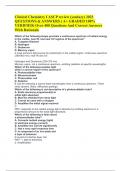
-
Clinical Chemistry I ASCP review (youlazy) 2023 QUESTIONS & ANSWERS ( A+ GRADED 100% VERIFIED) Over 400 Questions And Correct Answers With Rationale
- Exam (elaborations) • 88 pages • 2023
- Available in package deal
-
- $13.49
- + learn more
Clinical Chemistry I ASCP review (youlazy) 2023 QUESTIONS & ANSWERS ( A+ GRADED 100% VERIFIED) Over 400 Questions And Correct Answers With Rationale Which of the following lamps provides a continuous spectrum of radiant energy in the visible, near IR, and near UV regions of the spectrum? A. Tungsten-filament B. Hydrogen C. Deuterium D. Mercury vapor A most common light source for photometry in the visible region. continuous spectrum (360-800 nm). near IR and UV. Hydrogen and Deuterium...
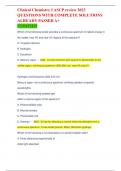
-
Clinical Chemistry I ASCP review 2023 QUESTIONS WITH COMPLETE SOLUTIONS ALREADY PASSED A+ VERIFIED
- Exam (elaborations) • 169 pages • 2024
-
- $11.49
- + learn more
Which of the following lamps provides a continuous spectrum of radiant energy in the visible, near IR, and near UV regions of the spectrum? A. Tungsten-filament B. Hydrogen C. Deuterium D. Mercury vapor - ANS A most common light source for photometry in the visible region. continuous spectrum (360-800 nm). near IR and UV. Hydrogen and Deuterium (200-375 nm) Mercury vapor- not a continuous spectrum, emitting radiation at specific wavelengths Which of the following isolates light within...
QUESTIONS AND ANSWERS
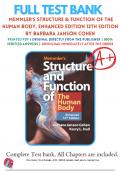
-
Test Bank for Memmlers Structure and Function of the Human Body 12th Edition by Cohen | Complete Guide A+
- Exam (elaborations) • 505 pages • 2024
-
- $19.99
- 2x sold
- + learn more
Test Bank Memmlers Structure and Function of the Human Body 12th Edition Cohen Chapter 01: Introduction to the Body MULTIPLE CHOICE 1. The word derived from two word parts that mean ―cutting apart‖ is a. physiology b. homeostasis c. anatomy d. dissection ANS: C DIF: Memorization REF: p. 3 OBJ: 1 TOP: Introduction 2. The study of how the body functions is called a. physiology b. homeostasis c. anatomy d. dissection ANS: A DIF: Memorization REF: p. 3 OBJ: 1 TOP: Introduction 3. The correct seq...
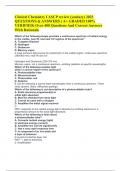
-
Clinical Chemistry I ASCP review (youlazy) 2023 QUESTIONS & ANSWERS ( A+ GRADED 100% VERIFIED) Over 400 Questions And Correct Answers With Rationale
- Exam (elaborations) • 88 pages • 2023
-
- $13.49
- + learn more
Clinical Chemistry I ASCP review (youlazy) 2023 QUESTIONS & ANSWERS ( A+ GRADED 100% VERIFIED) Over 400 Questions And Correct Answers With Rationale Which of the following lamps provides a continuous spectrum of radiant energy in the visible, near IR, and near UV regions of the spectrum? A. Tungsten-filament B. Hydrogen C. Deuterium D. Mercury vapor A most common light source for photometry in the visible region. continuous spectrum (360-800 nm). near IR and UV. Hydrogen and Deuterium...

How did he do that? By selling his study resources on Stuvia. Try it yourself! Discover all about earning on Stuvia

